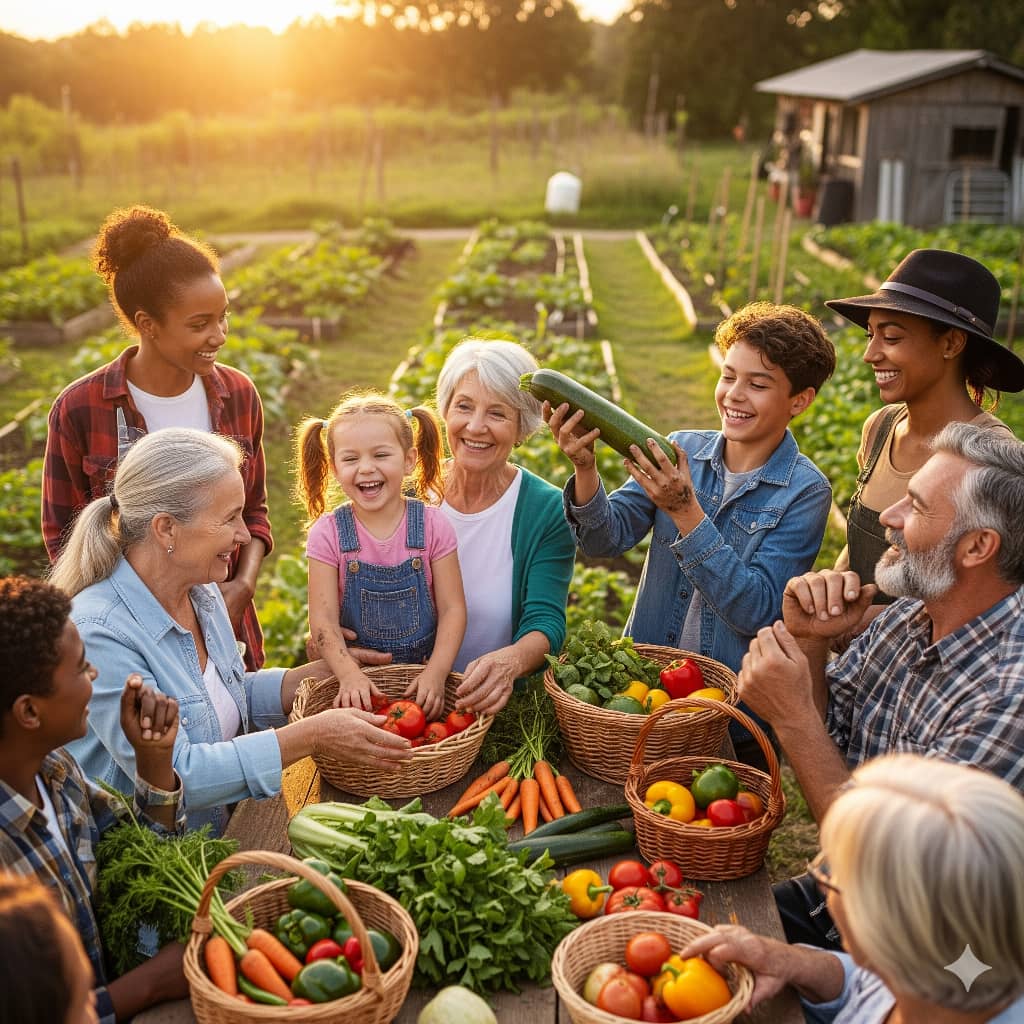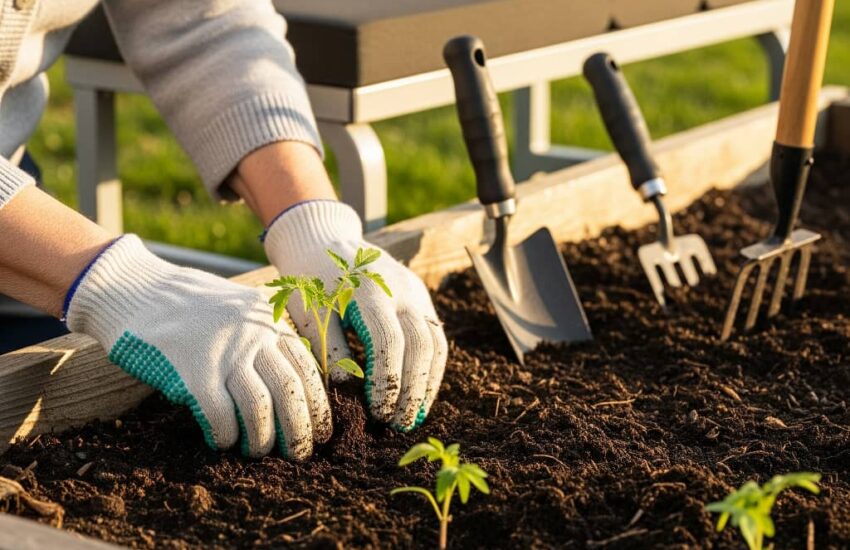When my 78-year-old neighbor, Margaret, first showed me her raised garden bed, I saw more than vegetables; I saw a revolution in how we approach aging. After losing her husband, Margaret had withdrawn into her home, her world shrinking to the four walls of her living room. Then her daughter built her a waist-level planter box outside her kitchen window. What began with a few tomato plants became a thriving garden and Margaret’s pathway back to herself. She gained strength from digging, purpose from nurturing seedlings, and a sense of community from sharing harvests with her neighbors. Her story illustrates why gardening isn’t just a hobby for seniors; it’s a powerful therapeutic tool that addresses multiple dimensions of wellness. Gardening offers seniors physical, mental, and emotional benefits that extend beyond the enjoyment of fresh produce. Discover how to create accessible gardens that promote wellness, purpose, and joy in later life.
The physical benefits of gardening extend far beyond mild exercise. The combination of digging, planting, weeding, and watering provides low-impact strength training, improves flexibility, and enhances cardiovascular health. For seniors with arthritis or mobility limitations, adaptive tools like ergonomic trowels, kneelers with handles, and vertical planters make participation possible without strain. Margaret’s garden became her physical therapy, she regained hand strength through squeezing watering cans and improved her balance while moving between planters. Her cardiologist noted improved blood pressure readings that coincided with her daily gardening routine, something research attributes to both physical activity and time spent outdoors in nature.
Cognitive protection represents another significant benefit. Gardening requires planning, problem-solving, and learning—all of which help maintain neural connections. Remembering planting schedules, distinguishing between weeds and seedlings, and adapting to weather changes engage executive functions that might otherwise decline with disuse. Studies have shown that gardening can reduce dementia risk by up to 36%, possibly by combining physical activity, sensory stimulation, and cognitive engagement. Margaret began studying companion planting techniques, surprising her family with her detailed notebooks about which plants thrived together—a mental exercise that kept her mind as active as her body.
The psychological impact is perhaps the most profound. Gardening provides a sense of purpose and accomplishment that many seniors lose after retirement or bereavement. Watching seeds transform into plants offers tangible evidence of one’s efficacy and patience. For those struggling with depression or anxiety, the rhythmic nature of gardening tasks can induce meditative states that reduce stress hormone levels. Margaret told me that during her most difficult grief moments, focusing on her plants’ needs gave her a reason to get out of bed, a small but crucial responsibility that anchored her days.
Social connection grows naturally in the garden. What began as a solitary activity for Margaret soon became communal. Neighbors would stop to admire her progress, leading to conversations and seed exchanges. She joined a gardening club at her senior center where members shared tips and produce. These interactions combated the isolation that affects nearly one-third of seniors, creating natural opportunities for relationship-building without the pressure of formal socializing. When her tomato harvest overflowed, Margaret began leaving baskets on neighbors’ porches, small acts of generosity that strengthened her sense of belonging and purpose.
Nutritional benefits emerge from growing one’s food. Seniors who garden tend to eat more fresh fruits and vegetables, often trying varieties they wouldn’t find in supermarkets. The pride of growing food encourages healthier eating habits, while the convenience of having produce steps away makes nutritious choices easier. Margaret discovered heirloom vegetables she’d never tasted before and began preserving her harvest through canning and freezing, activities that provided additional cognitive and physical engagement while extending her garden’s benefits through winter months.
Accessible garden design ensures everyone can participate. Container gardens on patios or balconies work for those with limited space, while raised beds and vertical gardens accommodate mobility devices. For seniors with vision impairment, sensory gardens with fragrant herbs like lavender and mint and textural plants like lamb’s ear provide rich experiences beyond visual beauty. Margaret’s daughter eventually added a comfortable seating area surrounded by containers, transforming the garden into an outdoor living room where Margaret could read or simply enjoy the sunlight—further increasing her vitamin D absorption and mood regulation.
The life cycle lessons in gardening offer particular comfort in later life. Witnessing plants die back in autumn and return in spring provides a gentle metaphor for resilience and continuity. Many seniors find peace in this natural rhythm, particularly when facing their own mortality or health challenges. Margaret began saving seeds from her best plants, sharing them with younger gardeners, a symbolic passing along of knowledge and life that felt deeply meaningful amid the losses she’d experienced.

Intergenerational gardening creates unique bonding opportunities. When Margaret’s grandchildren visited, they helped plant sunflower seeds and hunt for ripe strawberries. These activities gave them shared purpose without generational barriers, allowing Margaret to teach skills and stories in ways that felt natural and valued. The garden became their meeting place where conversations flowed more easily than indoors, and where Margaret could contribute her expertise rather than always receiving care.
Therapeutic horticulture programs now formally incorporate these benefits. Healthcare providers increasingly “prescribe” gardening for conditions ranging from hypertension to depression, recognizing its multimodal advantages. Margaret’s physician eventually recommended she help start a garden at her rehabilitation center, where she taught other seniors how to build container gardens, an opportunity that leveraged her experience into meaningful contribution.
Beginning requires minimal investment but offers maximal returns. Starter kits with seeds, soil, and containers make gardening accessible even for those with no prior experience. Community gardens often offer senior plots at reduced rates, while programs like Gardening Matters provide resources specifically for older adults. Margaret began with a $25 investment in seeds and soil, a modest cost that yielded months of engagement, improved health, and reconnection with her community.
Gardening ultimately offers seniors something medication cannot: a sense of agency and connection to the natural world. It transforms passive recipients of care into active creators of beauty and nourishment. Margaret’s garden didn’t just grow vegetables, it grew a renewed sense of identity, purpose, and joy that permeated every aspect of her life. In the simple act of planting a seed, she found reason to believe in tomorrow.
References
Senior Services of America. (2023, November 2). Explore the benefits of gardening for seniors. https://seniorservicesofamerica.com/blog/benefits-of-gardening-for-seniors/
This source outlines physical benefits like maintaining dexterity, providing light daily exercise, and boosting immunity, as well as mental health benefits including reduced stress and anxiety.
Westminster Communities. (2025, June 30). Health benefits of gardening for seniors. https://westminstercommunitiesfl.org/news/uncategorized/2025/06/starting-your-own-garden-the-mental-and-physical-health-benefits-for-seniors/
Discusses gardening’s positive effects on emotional well-being, cognitive function, and social interaction for older adults.
Charter of Chattanooga. (2025, April 13). Dig into the benefits of gardening for seniors. https://www.charterofchattanooga.com/blog/dig-into-the-benefits-of-gardening-for-seniors/
Highlights how gardening offers light exercise, improves balance, provides vitamin D from sun exposure, and helps reduce blood pressure.
Nurse Next Door. (2023, May 30). 8 blooming health benefits of gardening for seniors. https://www.nursenextdoor.com/blog/6-health-benefits-of-gardening-for-seniors
Details stress relief, physical activity, cognitive stimulation, and social connection benefits from gardening tailored to seniors, including tips for safe gardening.
Embassy Healthcare. (2025, March 20). Benefits of gardening for seniors: Physical & mental health. https://embassyhealthcare.net/blog/benefits-of-gardening-for-seniors-physical-mental-health
Emphasizes gardening’s role in reducing depression, fostering mindfulness, enhancing cognitive function, and creating a sense of accomplishment.

